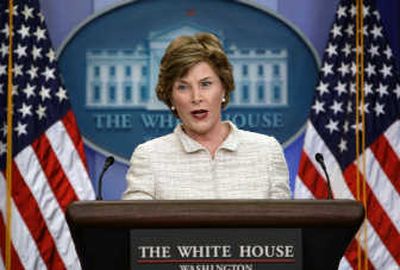First Lady grows into diplomat role

WASHINGTON – When President Bush spoke Tuesday about the U.S. response to the killer cyclone in Myanmar, first lady Laura Bush was standing right behind him in the Oval Office. But really, she was the one out front.
She presided in the White House briefing room one day before the president spoke on the devastation in South Asia. She blistered military leaders in Myanmar as being “very inept” for repressing citizens and decimating an economy, and urged them to accept humanitarian aid to help a shaken nation recover.
This is Laura Bush since her husband’s second term began: ever comfortable with her platform, increasingly prominent on international affairs.
It is a long way from what she jokingly calls her prenuptial agreement with George W. Bush – she’d marry him if she never had to give a speech.
The first lady’s more public profile on policy matters at home and abroad is not suddenly new, although it appears to grow all the time. Her appearance on Monday marked the first time she had presided over a news conference in the briefing room, and she seemed perfectly at ease in doing it.
The topic was a natural for her.
She is outspoken in defense of the people of Myanmar, also known as Burma, where military rulers have repressed basic freedoms. She was planning to voice concerns anyway about an upcoming constitutional vote in Myanmar, then broadened her comments when the cyclone hit.
“She’s able to bring attention to issues that Americans might not ordinarily pay attention to,” said Gordon Johndroe, the White House spokesman on national security affairs and a former press secretary to the first lady. “We have a lot of issues we focus on. Burma is not one that we focus on every day.”
She has a personal interest in Myanmar and the story of democracy advocate Aung San Suu Kyi, who is under house arrest.
Yet other examples of the first lady’s visible role abound.
She ventured into foreign policy at the 2004 Republican National Convention with a speech devoted in large part to the wars in Iraq and Afghanistan. She showed an outspoken side during trips to Afghanistan and the Middle East in 2005, promoting equal rights for women and delving into regional politics.
As first lady, she also has made five trips to Africa, where U.S. efforts to combat AIDS and Malaria are highly regarded even by her husband’s critics. Her portfolio has only expanded, from domestic matters such as literacy, drug prevention and national parks to the more sensitive topics of global diplomacy.
“It took me a while to realize what a platform I had,” she said last year, acknowledging that she has spoken up more in the second term. But the first lady also said she had been unfairly stereotyped as “being a certain way because I was a librarian and a teacher and, you know, had the careers that traditional women have.”
Politically speaking, she is a winner for the White House.
She tends to get high public approval ratings, unlike her husband.
That popularity translates overseas, where the first lady is an effective diplomat for her husband. “There are few people who can gain the type of access or attention that she gets when she goes places,” Johndroe said.